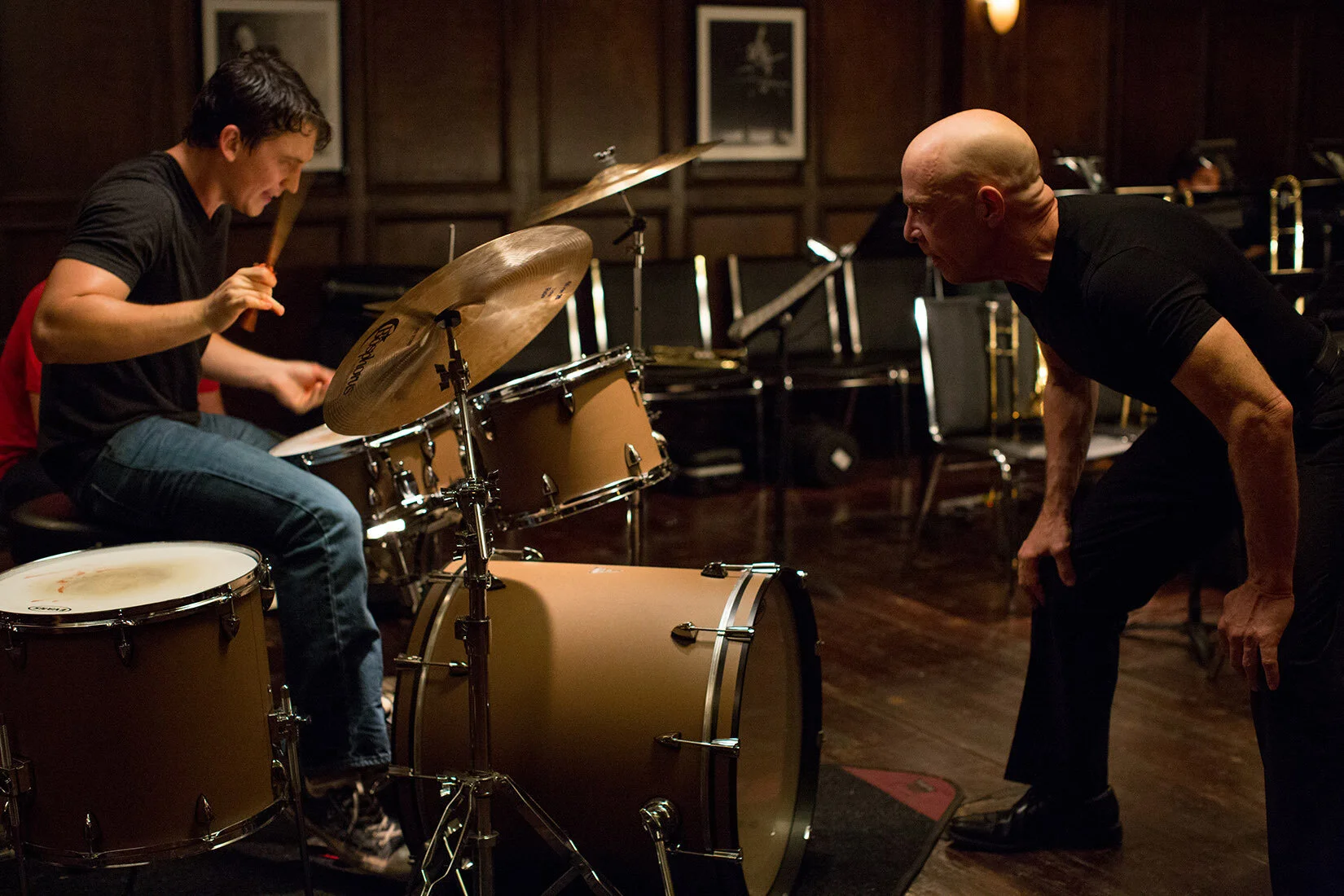‘Whiplash’ Review
Blood. Sweat. Tears. These are the ingredients that make up Whiplash, a pulse-pounding, expertly crafted thriller that serves as a cautionary tale about how far one must push themselves to become one of the greats. It will ramp your nerves up to eleven while at the same time picking your brain with questions about whether the ends justify the means. But don’t let this scare you away; it’s utterly captivating with two dynamic performances at the center, a tight screenplay, and a rhythmic blend of editing and cinematography.
We follow the story of young jazz drummer Andrew Neiman (Miles Teller) who has been accepted into Shaffer Conservatory, one of the greatest music schools in the country. From the first shot Andrew’s drive is made apparent to us when the camera does a slow dolly in toward him while he practices. When we get close enough to him he looks up and apologizes. We then cut to the infamous Terrence Fletcher (J.K. Simmons) a famed conductor at the school whose studio band serves as a mark of potential greatness if you are inducted. We have been watching Andrew from his point of view. We are judging him. The tone is set. Andrew does eventually make it into Fletcher’s band and from then on we are treated to a roller coaster ride of humiliation, mind games, and physical and mental abuse.
You can tell this a very personal tale from young writer and director Damien Chazelle who himself used to be a jazz drummer in a situation similar to Andrew’s. In an interview Chazelle said he “wanted to make a movie about music that felt like a war movie, or a gangster movie – where instruments replaced weapons, where words felt as violent as guns, and where the action unfolded not on a battlefield, but in a school rehearsal room, or on a concert stage.” This motif is evident in the violent and venomous mood. Fletcher can be seen as a drill instructor: he uses every weakness and insecurity in his students to push them to their maximum potential. He may not be this much of a monster in real life but in the classroom it’s his job to find the next Charlie Parker, a recurring talking point in the film.
Andrew appears to be the perfect subject for Fletcher’s teaching methods. He’s obsessed with becoming one of the greats and has little interest in anything else. He’s constantly passing by out of focus students in the halls and everything they say is muffled, catching only the broad strokes of their speech. He sacrifices social relationships in favor of practice time and sees settling for anything less than perfection as a weakness. This is most apparent in his relationship with his father (Paul Reiser), a high school English teacher. Andrew never calls his father out on his perceived shortcomings but disappointed glances and careful camera work tell us all we need to know. Even though his father is a genuine and caring individual Andrew’s ties to him subtly erode throughout the film in favor of the brutal but far more accomplished Fletcher.
Two characters this complex require careful, nuanced performances and Teller and Simmons knock it out of the park. Fletcher could easily become a caricature in a lesser actor’s hands but Simmons deftly balances the intensity and sincerity required for this character. You laugh in spite of yourself when he’s humiliating his students because his insults are so perfectly delivered but at the same time you’re shocked by his relentless cruelty. Miles Teller walks that fine line between timidity and smirking confidence. Andrew is similar to the cocky but loveable frat boys Teller specializes in playing but he is the subtlest version of that archetype. His shaky footing in the beginning allows you to identify with his struggle but his descent into self-importance and bodily harm leads you to pity and detest him. It’s his best work to date.
For a small movie about music school this film has some epic visual storytelling. It’s clear that Chazelle understands the language of film. Every shot, edit, and music cue blend together and create a flowing narrative. Sharone Meir’s cinematography and Tom Cross’s editing are always in sync, particularly in the rehearsal and concert scenes. Cross edits to the beat of the drum and Meir makes a visual distinction between the professionals and the novices with close ups on the former and medium shots on the latter. There’s one striking shot when Andrew is having a ferocious practice session and his hand starts to bleed. He sticks his bleeding hand in a clear pitcher filled with ice water. We then see a close up of the pitcher as the blood slowly eclipses the pure liquid, a perfect visual metaphor for Fletcher’s corruption of Andrew’s mind.
Whiplash will be revered as a classic in the years to come because it takes the familiar student and mentor trope and injects it with the intensity of boot camp. You will be shocked and exhausted by the brutality but the film is entertaining enough that you will be brought back for a second and third viewing. When a film can make a jazz concert one of the most exciting and nerve racking climaxes of the 21st century you know it’s doing something right.
★★★★★
